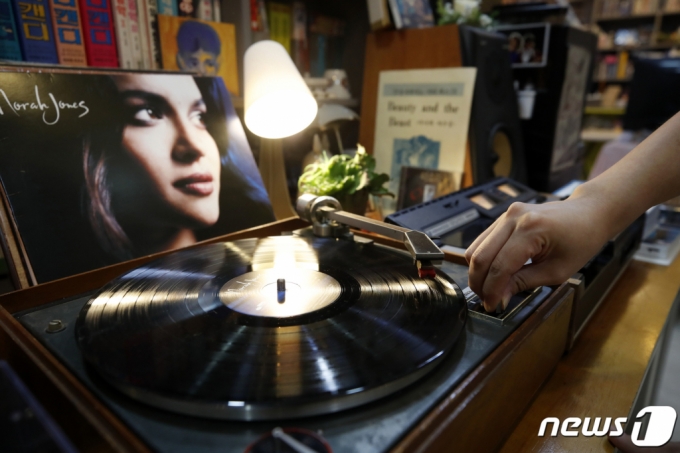 (서울=뉴스1) 이승배 기자 = 서울 종로구 서울레코드에서 턴테이블이 작동되고 있다. 2021.8.9/뉴스1
(서울=뉴스1) 이승배 기자 = 서울 종로구 서울레코드에서 턴테이블이 작동되고 있다. 2021.8.9/뉴스1 그러나 한국에선 이러한 열풍을 찾아보기 어렵습니다. 한국에도 음반 가게들이 있고 몇몇 턴테이블 모델을 구입할 수도 있지만, 보통은 먼지가 쌓여 있고 심지어 죽은 곤충이 들러붙어 있기도 합니다. 왜그럴까요?
아울러 국경을 둘러싼 위협으로 인해 한국에서는 향수를 불러일으키는 오락을 불필요한 족쇄로 여기는 긴장과 진지함의 분위기가 우세합니다. 타이트-루즈(tight-loose) 이론에 따르면 '영토 위협이 있는' 또는 '천연 자원이 더 적은' 국가는 새로운 아이디어에 덜 개방적인 '더 엄격한' 문화를 갖는 경향이 있습니다.
대부분의 사람들은 레코드음반이 디지털 파일에는 없는 특정한 매력이 있다는 데 동의할 것입니다. 레코드와 턴테이블을 즐길 수 있는 문화가 있는 미국과 같은 나라에서 레코드음반이 이렇게 인상적인 컴백을 하는 것은 놀라운 일이 아닙니다. 반면 혁신과 효율성에 집착하는 문화에 살고 있는 많은 한국인들에겐 아직 레코드음반의 장점이 비실용성을 능가하지 않은 것 같습니다. 훨씬 더 편리한 대안이 가까이에 있으니까요.
하지만 누가 알겠습니까? 언젠가 한국에서도 사람들이 주머니 대신 레코드 커버에서 음악을 꺼내들 날이 올지 모릅니다.
이 시각 인기 뉴스
[영어 원문]
Why Did the Vinyl Boom Hit Some Cultures More Than Others?
In recent years, the demand for vinyl in America has boomed to the point of records and turntables popping up in places we wouldn't expect to find them, like clothing stores. Much of this renewed interest in vinyl, it's said, stems from the fetishization of what's retro, the joys of collecting, and the tactile pleasures that digital music can't deliver.
But this trend hasn't quite hit South Korea. There are some vinyl shops, and you can find a few models of turntables to buy, but they're usually caked with dust and sprinkled with dead insects; South Korea's throwback to retro seems a tiny fraction of its RPM in the U.S. Why is that?
One explanation is the cultural place of technology. Korea is tech-forward and innovation-obsessed because it's a tiny and cramped country without many natural resources: Tech doesn't require acres of space to develop -- and doesn't take up much space at all in our homes. Plus, electronics companies are responsible for a massive slice of Korea's economy. Naturally, it's a place where people are more interested in the latest gadgets than dusting off their grandparents' toys. Koreans tend to prioritize functionality and efficiency over sentimentality and delicacy.
Moreover, the threat alongside its borders has washed over Korea an atmosphere of tension and seriousness that sees nostalgic pastimes as unnecessary and fettering. According to the tight-loose theory, countries with "territorial threats" or "fewer natural resources" tend to have "tighter" cultures that are less open to new ideas.
Another explanation is that Koreans and Americans listen to different music, and they listen differently. For K-pop listeners -- think BTS fans -- the music often takes a backseat entirely to the artists' personas: They love to follow what their favorite singers wear, eat, and where they travel. And unlike Americans who still value the idea of the album, K-pop fans mostly listen to playlists of handpicked songs. This way of enjoying music defeats the purpose of vinyl. And because Korea's music scene is K-pop dominated -- contrarily to America's more diverse one -- this applies to most Koreans.
Most would agree that vinyl has a certain charm that digital files lack. It's no wonder how it made such an impressive comeback in a country like the U.S., where the culture has the leeway for delicacies like records and turntables. But this trend hasn't taken off in Korea yet, because for many Koreans, who live in a culture that's obsessed with innovation and efficiency, the merits of vinyl simply don't outweigh the impracticalities, especially when much more convenient alternatives are mere taps away.
But who knows? Perhaps there will come a day in Korea when people will draw their
music from a record sleeve instead of their pocket.
